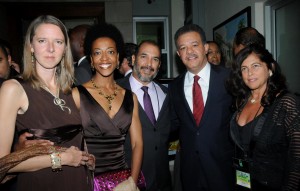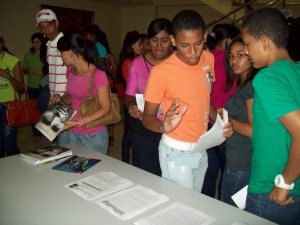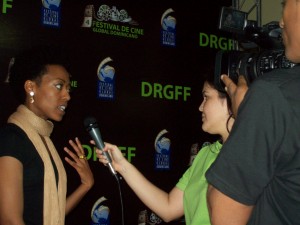Dominicans, traces, and race
Posted November 25th, 2010 by Katrina BrowneCategory: News and Announcements Tags: Juanita Capri Brown, Katrina Browne, Traces of the Trade
 Juanita Brown, the co-producer of Traces of the Trade, and I were invited to screen Traces as part of FUNGLODE’s Dominican Republic Global Film Festival… a truly special film festival that I can’t say enough good things about.
Juanita Brown, the co-producer of Traces of the Trade, and I were invited to screen Traces as part of FUNGLODE’s Dominican Republic Global Film Festival… a truly special film festival that I can’t say enough good things about.
Our visit to the country was sponsored by the U.S. embassy there, to whom we are very grateful!!! It was an incredible chance to test again, after going to Cuba, how the Spanish-subtitled version of the film does or does not resonate for people in former Spanish colonies that were built on a slave-based economy.
 What we heard and saw were that race issues in DR are very “different but the same.” For one thing, the population is generally much more conscious about being of mixed race, so people have to determine which part(s) of themselves and their heritage to focus on, or how to integrate all those parts into their identity. There is clearly an orientation towards “we’re Dominicans” more than towards racial identity, but we read and had confirmed that people do tend to associate their darker skin more with “indio” heritage (from the Taino native population) than with African heritage. Given that the Taino population was so massively decimated historically, it is more likely for people to have African heritage. But clues such as how women straighten their hair show that there is a favoring of European/Spanish and Taino heritage over African. I’m treading lightly here and felt the need to there, which shows the delicacy of it all.
What we heard and saw were that race issues in DR are very “different but the same.” For one thing, the population is generally much more conscious about being of mixed race, so people have to determine which part(s) of themselves and their heritage to focus on, or how to integrate all those parts into their identity. There is clearly an orientation towards “we’re Dominicans” more than towards racial identity, but we read and had confirmed that people do tend to associate their darker skin more with “indio” heritage (from the Taino native population) than with African heritage. Given that the Taino population was so massively decimated historically, it is more likely for people to have African heritage. But clues such as how women straighten their hair show that there is a favoring of European/Spanish and Taino heritage over African. I’m treading lightly here and felt the need to there, which shows the delicacy of it all.
The other painful subject is Dominican racism towards Haitians—those with whom they share the two-nation island—which many Dominicans admitted to us was real and intense, when we spoke privately. Before this trip I reread a summary history of the Haitian Revolution (which ended slavery and created the first nation founded by former slaves), and found myself thoroughly depressed by the layers of conflict and the impact of monied interests in France, Spain and the U.S. It is not hard to see how the past has shaped the present.
 Our screenings generated some of this kind of discussion. Audiences, from high school students, to street children, to college students, to adults, were on the edge of their seats as Juanita led the dialogues afterwards. She is fluent in Spanish and people clearly felt greatly honored by her language skills, as well as moved by her powerful way of telling her story and framing the issues. We had a chance to be featured on national television and are already in conversations about a possible national broadcast.
Our screenings generated some of this kind of discussion. Audiences, from high school students, to street children, to college students, to adults, were on the edge of their seats as Juanita led the dialogues afterwards. She is fluent in Spanish and people clearly felt greatly honored by her language skills, as well as moved by her powerful way of telling her story and framing the issues. We had a chance to be featured on national television and are already in conversations about a possible national broadcast.
We were greatly honored to meet the President of the Dominican Republic, Leonel Fernandez (shown above), who subsequently had a private screening of the film. We were also very honored to meet the new U.S. ambassador, Raul Yzaguirre, who attended our festival screening in Santo Domingo, at the end of his first week in his new position. As he is a giant in Latino rights issues in the U.S., we were so grateful for his presence and look forward to on-going work on the complex issues that surround legacies of slavery in Latin countries and how that impacts Afro-Latino immigrants in the U.S.



Leave a Reply